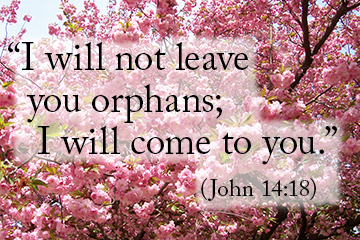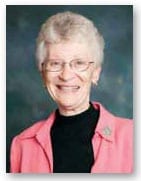Readings: Acts 8: 5–8,14–17; Psalm 66; 1 Peter 3:15–18; John 14:15–21
 Fifty years ago today I professed my final vows as a Sister of Charity. Like generations of women before me, I committed myself to live in poverty, celibate chastity and obedience for life, according to the Constitution of the Sisters of Charity of New York. But unlike the sisters who preceded me, I and other sisters were invited to frame our vows in personal statements: what the vows meant to each of us, how we expressed our beliefs, hopes and desires for our life and our community.
Fifty years ago today I professed my final vows as a Sister of Charity. Like generations of women before me, I committed myself to live in poverty, celibate chastity and obedience for life, according to the Constitution of the Sisters of Charity of New York. But unlike the sisters who preceded me, I and other sisters were invited to frame our vows in personal statements: what the vows meant to each of us, how we expressed our beliefs, hopes and desires for our life and our community.
In a way, we were doing what Peter in today’s reading urges all believers to do: to be ready to explain the reason for our hope (1 Peter 3). It’s what the psalmist was doing: “Hear now, all you who revere God, while I declare what he has done for me.” (Ps. 66) As the pandemic progresses and people question where God is in it all, you and I are being invited to put into words why we do what we do, why we live the way we live, why we keep walking the path of love, service and care for those — even for Earth, our common home — overlooked by others.
In my vow statement I prayed: “May the mystery of your love give me strength to seek out the mystery of my life.” Those mysteries, most of the time, play hide and seek in my life, as they probably do in yours. But I’ve learned that if I pay attention — as the people of Samaria did when Philip unpacked the mystery of Christ for them (Acts 8) — the ever-unfolding mystery of God’s love in my life gradually comes into focus, even if just for a moment.
This extraordinary time of worldwide pandemic invites us to slow down, to reflect, to take a wide and deep look at ourselves and the way we live, to appreciate and recalibrate. It calls you and me, individually and as a world community, to change. It summons us to transformation. Some changes will surely be beyond our control; others are well within our power to choose. I believe in a God who did not send us the Covid-19 virus, but who can and does use human events to create something new. Moments like this, times of shared crisis, can open our eyes and hearts and move us to change ourselves and our society for the better.
On that May day years ago, surrounded by my sisters, family and friends, I ended my vows by saying that I desired to trust that Christ’s Spirit “who fills the world is never absent from our hearts.” That Spirit, never absent, always near, is the focus of today’s Gospel. Jesus (in John’s telling) finds many ways to convince us that, even though he must leave us in one sense, he will never leave us alone. He sends us his own Spirit as an advocate, an intimate friend and support, a power beyond all earthly powers, who remains with us and will be in us always (John 14).
Jesus gives us a Spirit who shows us how and when to pay attention. A Spirit who gives us words to explain the reason for our hope. A Spirit who opens us to be transformed in ways we can’t begin to imagine, and who stays with us — never absent — through the long and messy process of change. A Spirit who gives us the power to love and to be loved, without bounds, unstoppably, as God loves. This is Jesus’ own Spirit; this is the Spirit we have all received, the Spirit who is the reason for our hope.
Soon, on Pentecost Sunday, we will officially and liturgically (even if virtually) celebrate God’s gift of that Spirit. But make no mistake about it: now, here, in the depth of our hearts and the breadth of our universe, the Spirit is and remains with us, never far, never absent. And if that isn’t a reason for hope, I don’t know what is.
– Sr. Regina Bechtle
 Sr. Regina, a retreat leader, speaker, writer and spiritual director, serves as Charism Resource Director for the Sisters of Charity of New York.
Sr. Regina, a retreat leader, speaker, writer and spiritual director, serves as Charism Resource Director for the Sisters of Charity of New York.
Photo by Regina Bechtle, SC

Dear Regina,
Congratulations! Fifty years WOW!
Thank you for your commitment and for continually calling the rest of us into that great Mystery of Love.
What a beautiful flow to your words! Always a pleasure to read a great writer and spiritual mentor. We SCs are blessed to have your “Spirit” in our midst. God Bless!
Dear Sr. Regina,
Congratulations on the 50th anniversary of your commitment as a Sister of Charity. Thank you for sharing your beautiful words during this very difficult time reminding us that God is always with us.
Congratulations, Regina!
Thank you for the hope-filled reminder to be open to the Spirit who transforms and surprises beyond our imaginings.
May we be gifted with peace and patience in waiting for “something new.”
Anniversary Blessings Regina. Thank you for your inspirational
reflection ❤️
Dear Regina,
As multi annos! Little did either of us foresee this day when we gathered at the back of the motherboard in September 1962! Congratulations!
Congratulations! Beautifully and hopefully expressed.